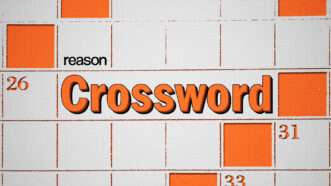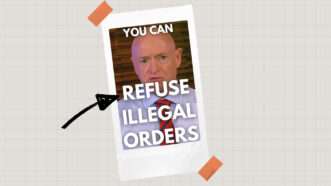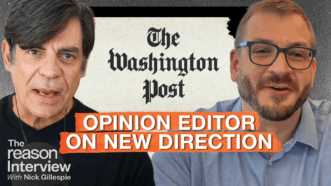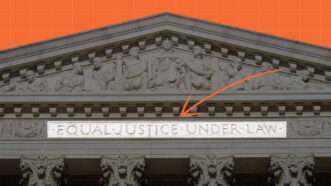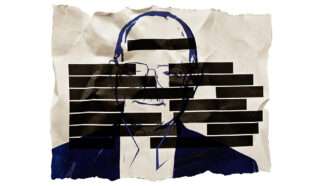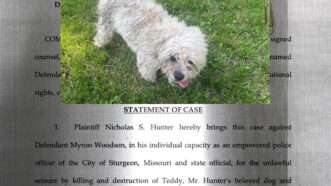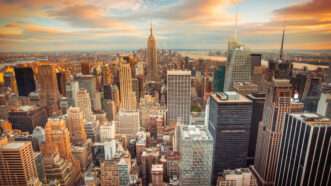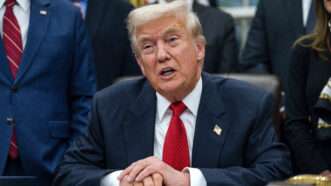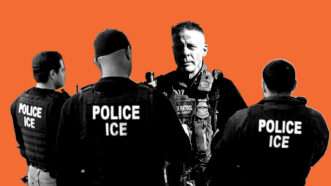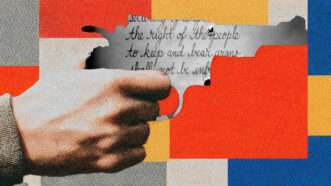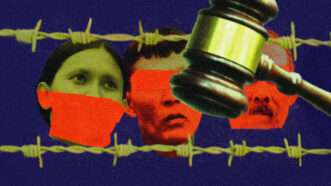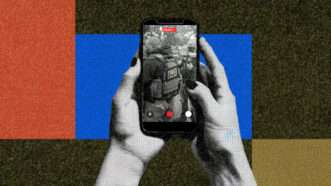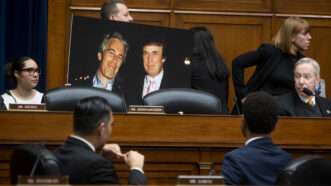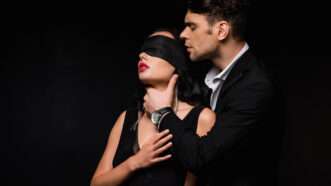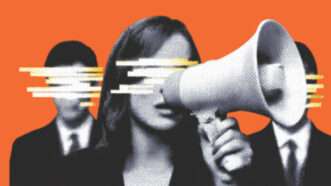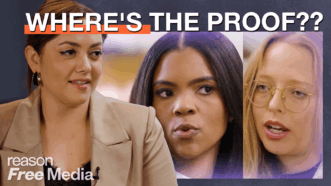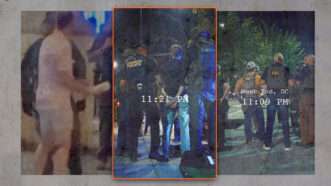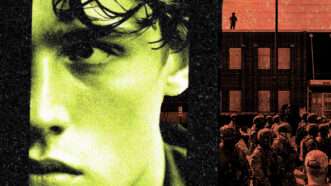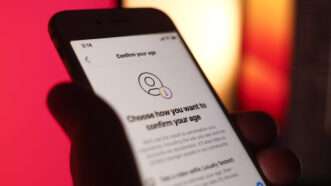Civil Liberties
Some Democrats Urge the Military To 'Refuse Illegal Orders.' What if the IRS, ATF, and EPA Did the Same?
Much of what the federal government does on a daily basis flouts constitutional protections and offends human decency.
US News and World Report Article Urging Colleges to Reject Trump's "Compact" With Higher Education
I coauthored the article with four other legal scholars from across the political spectrum.
Tradwives Are Feminists, Too
Tradwives are fighting the cultural stigma that still remains around being a homemaker. That makes them damn good feminists.
Lindsey Graham Is Outraged About Federal Surveillance Powers That Lindsey Graham Helped Create and Expand
The government can look at your phone records whenever it wants, but it's a different story when we're talking about his metadata.
Is The Washington Post Becoming Libertarian?
The Washington Post opinion editor Adam O’Neal outlines his vision for a more classically liberal editorial voice, examines how both parties turned against free speech and free markets, and explains why the paper is ending political endorsements.
Eleventh Circuit Rejects Trump's Defamation Lawsuit Over CNN 2022 "Big Lie" Statement
President Trump "complained that, by using the phrase 'Big Lie' to describe his claims about the 2020 presidential election, CNN defamed him."
How Printing Presses Ignited the First Information Revolution
The printing press helped build libraries that were impossibly large by ancient standards. That created its own new challenges.
COVID Closure of Private Beach Access Constitutes a Taking
The Eleventh Circuit concludes "there is no COVID exception to the Takings Clause."
The Forgotten Classical Liberal Who Fought Jim Crow and Championed Immigration
Remembering the legacy of a principled legal activist.
Declassified Documents Detail the FBI's Surveillance of a Libertarian Sci-Fi Author
Vernor Vinge, who mocked the surveillance state in his writing, was investigated for alleged connections to socialist Sandinistas in Nicaragua.
Missouri Town Will Pay $500K To Settle Lawsuit Over Deputy Shooting Blind and Deaf Dog
The Animal Legal Defense Fund says it's one of the largest settlements for the police killing of a dog.
This Gun Case Harks Back to Constitutional Concerns About the Limits of Federal Power That Now Seem Quaint
Congress justified that National Firearms Act of 1934 as a revenue measure—a rationale undermined by the repeal of taxes on suppressors and short-barreled rifles.
Heat Index Inside a South Florida Prison Hit 119 Degrees, Report Says
A lawsuit challenging extreme heat in a Florida prison collected temperature readings during the summer. It found brutal heat persisted day and night.
Judge Reverses Earlier Decision: Ex-Employee Can't Sue Planned Parenthood for Race Discrimination as a "Jane Doe"
[UPDATE 11/17/2015 10:21 am: Sorry, post title originally accidentally omitted the "as a 'Jane Doe'" (which of course is what this decision is about, see below); I've revised the title to include it. My apologies!]
Is the Federal Prohibition on Felon Firearm Possession Constitutional?
Judge Willett thinks that some federal statutes have been interpreted and applied in ways that conflict with the notion that the federal government only has limited and enumerated powers.
An Indiana Mom Left Her Kids Home for an Hour. Her Husband's Ex-Wife Called Child Services.
After her husband’s ex repeatedly called child protective services over harmless parenting decisions, Hannah Bright is advocating for a new law to protect families from weaponized reporting.
A New Lawsuit Says New York's Rent Law Is Forcing Landlords To Keep Apartments Empty
Landlords argue that rent caps on vacant units prevent them from financing the costs of legally mandated renovations.
Trump Is Right: That BBC Documentary Misquoted Him
His lawsuit against the BBC is likely frivolous, however.
Border Patrol Chief Behind Chicago Crackdown Prepares New Operation in Charlotte
The Trump administration’s urban enforcement push is blurring the line between border control and domestic policing.
Why Does SCOTUS Hear So Few Second Amendment Cases?
The right to keep and bear arms occupies a curious place in American legal history.
Federal Judge Orders Over 600 ICE Detainees To Be Released From Custody
The order was made after finding that these individuals were arrested without a warrant or probable cause, and in violation of a consent decree.
Oregon Woman Says ICE Broke Out Her Car Windows and Detained Her for Filming Them
The First Amendment protects filming the police, but Berenice Garcia-Hernandez says she was dragged out of her car and detained for nearly seven hours for snapping photos of ICE agents.
Jeffrey Epstein: Trump 'Spent Hours At My House' With Victim
Congressional investigators released emails from the late sex trafficker discussing how to leverage his relationship with the future president.
Moral Panic About Rough Sex Gives Way to Censorship in the UK
British regulators and lawmakers are hot on a measure that would make possessing or publishing strangulation porn a crime.
Britain and Colombia Cut Off U.S. Intelligence Access Over Caribbean Boat Bombings
The two U.S. allies were OK with helping arrest suspected drug smugglers, but not with helping kill them.
5 Legal Reforms To Consider as Government Officials Lean on Critics
FIRE suggests laws to trim FCC power and protect free expression.
Candace Owens Can't Present Serious Evidence for Her Charlie Kirk Assassination Theories
The mainstream media have made serious errors. That doesn't mean every contrarian, fringe, or conspiratorial idea is automatically correct.
Trump Pardons Mountain Runner Michelino Sunseri, Who Was Prosecuted for Using an Unapproved Trail
The decision is consistent with the president's avowed concerns about "overcriminalization in federal regulations."
Greta Rideout's Landmark Rape Case Against Her Husband: 'I Did It for My Daughter'
Author Sarah Weinman's Without Consent tells the story of the legal and political battles to outlaw spousal rape in the U.S.
Will SCOTUS Resolve the Circuit Split on a Law That Disarms People With Nonviolent Criminal Records?
Steven Duarte is one of several petitioners who are asking the justices to address the constitutionality of that absurdly broad gun ban.
Federalist Society National Lawyers Convention Panel on Zoning, Property Rights, and the Housing Crisis
I participated along with James Burling (Pacific Legal Foundation), Prof. Peter Byrne (Georgetown), and Prof. Sara Bronin (George Washington University).
You Can Thank This Ohio Klansman for Expanding Your Freedom of Speech
Brandenburg v. Ohio established the "imminent lawless action" standard. More than 50 years later, partisans keep trying to apply it selectively.
D.C. Jury Acquits 'Sandwich Guy' of Assaulting Federal Agent
A jury found Sean Dunn, who went viral in August for throwing a Subway sandwich at a Border Patrol officer, not guilty.
Federal Judge Blasts 'Disgusting' ICE Facility Conditions, Orders Basic Humane Treatment for Detainees
“The evidence has been pretty strong that his facility is no longer just a temporary holding facility,” said U.S. District Court Judge Robert Gettleman. “It has really become a prison.”
The CHAT Act Won't Protect Kids, But it Might Break the Internet.
By forcing government ID verification for AI tools, Congress risks censoring everyday digital services and driving young Americans to unsafe overseas platforms.

